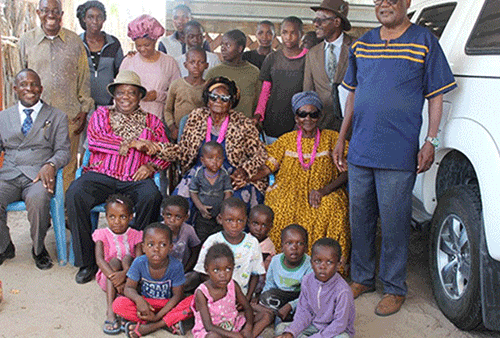OMHEDI – Long before she ascended to the throne as queen of the Oukwanyama in November 2005, Martha Mwadinomho yaKristian Nelumbu had been calling women who were not keen on raising their children to drop them off at her home.
This clarion call was made in her efforts to fight the ills of baby dumping in Namibia.
Today, the Oukwanyama palace is a home to over 60 children from mothers who answered the call. Some of the children have since left the palace as they transitioned into adulthood.
When New Era visited the palace, one could see that the queen has a special relationship with “her” children.
She knows them all by name and does not need a roll call to notice the children that were missing from the group.
“Come and greet the guests… kneel; you cannot greet the people while standing,” she tells the children in a loving yet disciplinary voice.
At times the children are all over her, climbing on her lap, which shows a close relationship and bond between them.
This affection is demonstrated in the way the queen shares with the children whatever the guest brought for her.
While she is also taking care of vulnerable children who were dropped off at the palace for various reasons, Nelumbu said many of the minors were victims of baby dumping.
In addition, she has also taken in survivors of rape, gender-based violence orphans, and abandoned children.
Albertina Nehemia (23), who grew up in the palace after she was taken there at the age of 11 when she was a fifth grader, is now employed and has her own home.
“My parents brought me to the palace because they were poor, hence they gifted me to Ohamba to take care of me,” she said.
Now that she is a grown-up and financially independent, she moved out of the palace to give space to the younger once who are continuously taking shelter at Nelumbu’s two palaces.
The queen resides at the Oukwanyama Traditional Authority palace at Omhedi village, but she also has a house of her own at Okambebe village.
“That palace will remain my home, and I will continue supporting it financially so that meekulu (queen) can as well assist the children that came after me,” said Nehemia.
Martha Sheehama, who also grew up in the palace, said she has been residing there from the time she was a year old.
She is now 28-years old and pursuing an Honour’s Degree in Education at the University of Namibia.
Sheehama is one of seven children who are now at the university. Several others have already graduated.
“We grew up watching a lot of vulnerable children being dropped off at the house; we all treated each other as siblings. Occasionally, an organisation or two would come through with donations but that is once in a blue moon. As I speak, we all depend on meekulu financially,” said Sheehama.
She said Nelumbu pays for their education including their accommodation at university. The queen also opts to send the children who are improving their grades to private schools instead of Namcol.
“At times you are in need, but you are just scared of asking her for money because we are well aware that we are too many and she is alone,” said Sheehama.
As one of the older children of the palace, she has been responsible of babysitting the little ones that were dropped off.
Older women like Sheehama are also tasked to see through the growing children into maturity.
“Once a child is dropped off at the palace, one of the big ladies will be given responsibilities of bathing, feeding and taking care of that specific child until she or he grows up and also informing Ohamba once their milk and nappies are finished, so that she can buy some for them,” she said.
All married men who were raised in the palace were given land to build their homes, so they could reside close to the queen and be assisted by her and for them to assist wherever they can.
Caption:



